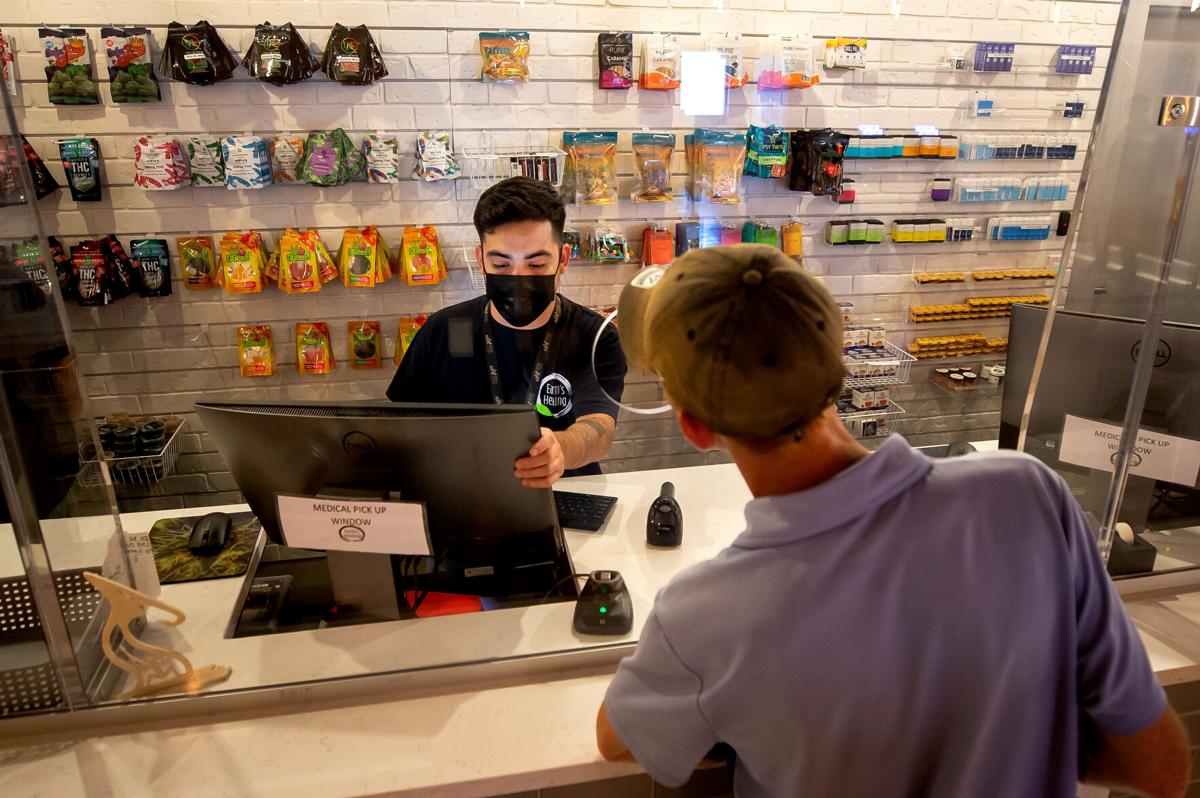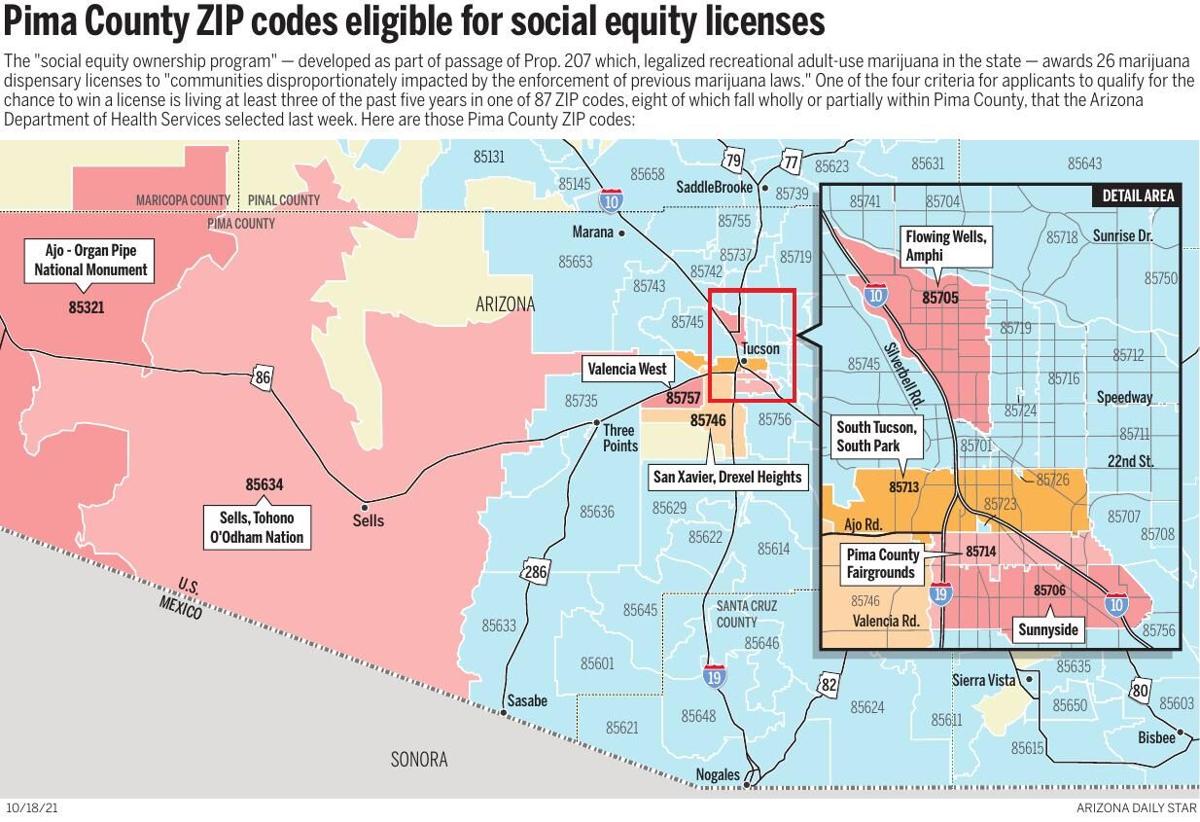The Arizona health department released a list of 87 ZIP codes, eight of which fall wholly or partially in Pima County, that will help determine the eligibility of applicants to the state’s “social equity” program for two dozen licenses to own marijuana dispensaries.
“(The Arizona Department of Health Services) conducted an extensive analysis concerning whether a community meets the social equity program’s requirement of disproportionate impact from the enforcement of previous marijuana laws,” the health department said.
Two weeks ago, the department released the 87 ZIP codes in Arizona that are essential for potential applicants to be eligible to meet the geographic requirement behind the state’s four-criteria application process. The local ZIP codes include an area west of Tucson that includes the Tohono O’odham Nation lands, on the south side, the southwest side, the southeast side, and a corridor along I-10 stretching north from the downtown area.
The ZIP codes selected locally are: 85321, 85634, 85757, 85746, 85705, 85713, 85714 and 85706.
Former ADHS Director Will Humble said the ZIP code selections are essential because of how many potential applicants are expected to check that criteria as part of their applications. “I mean we are talking up to 70% of applicants, potential applicants, here,” he said. The state will select who gets the special licenses, which can be financially lucrative to the holder, in early 2022.
For weeks, critics and potential licensees had wondered how the state came up with these ZIP codes? Now, the health department has made its methodology known.
Importance of ZIP codes
First, it helps to understand what makes the release of these ZIP codes so important in the context of the social equity ownership program. Passed as part of Proposition 207, which made adult-use recreational marijuana legal in the state, the “social equity ownership” program sets aside 26 licenses for “people from communities disproportionately impacted by the enforcement of previous marijuana laws.”
To be considered by the health department for the chance to win a social equity marijuana dispensary license, one must meet three of the following four criteria:
A household income less than four times the federal poverty level for three of the past five years. According to federal guidelines, a family of four could earn no more than $106,000 to qualify.
Either a previous marijuana conviction where expungement was granted, or a state or federal marijuana conviction. A copy of the expungement or conviction document must be submitted.
A spouse, parent, child, sibling or guardian who was convicted of a marijuana crime.
Proof of living three of the past five years in a “community that has been disproportionately affected by the enforcement of Arizona’s previous marijuana laws.”
The final criteria references the ZIP codes released this month. So for those potential applicants, living in the designated ZIP codes helps them meet one of the criteria that will be used by the state to approve an application for consideration.
But why are they so important?
Humble, who oversaw the rollout of Arizona’s medical marijuana program in his time as director, praised the department for at least acknowledging there has been an over-policing problem when it comes to marijuana possession.
“It’s the first time that I know of where the state has conceded, that there are areas that have been over-policed and over-prosecuted, don’t forget about that,” Humble said.
Mike Robinette, the executive director of the Arizona chapter of the National Organization for the Reform of Marijuana Laws, differed from Humble, giving credit instead to Arizona voters. “It truly is the reflection of Arizona’s voters’ will in passing Prop. 207 by a 60 to 40 margin,” he said.
Why ZIP codes?
Humble said the department most likely used ZIP codes as one of the criteria because it would be easy to administer that part of the selection process. “They can be verified easily and quickly when the applications come in,” he said.
However, according to potential social equity applicant and cannabis entrepreneur Zsa Zsa Simone Brown, using ZIP codes will open the applicant pool to people it wasn’t intended for. She gave a hypothetical example of being arrested in Maricopa County while living in a Pima County ZIP code that isn’t on the health department’s list.
“Let’s say I’m in Maricopa for the day and I got arrested, but I lived in Tucson and another ZIP code. I don’t qualify” for the ZIP code criteria, she said. “I can qualify as far as being arrested, but as far as the address and all that stuff, I still would not qualify.”
Instead of ZIP codes, Simone Brown said she is an advocate of using law enforcement districts or census tract areas tied to arrest and prosecution rates in a related jurisdiction to better target individuals she believes the social equity program was meant for.
But, Humble countered, easily trackable and actionable data is important for the licensing process.
“Administratively, you need something to verify, and ZIP code is super verifiable,” he said. “Whereas you don’t have ‘police beat’ on your water bill.”
Food assistance was considered
The department said it drew on data from the U.S. census’ 2019 racial population estimates and the Arizona Department of Economic Security’s numbers on the Supplemental Nutrition Assistance Program, or SNAP, to come up with two criteria for choosing the 87 eligible ZIP codes. Those two criteria used were the aggregate “minority” population and the number of people receiving SNAP benefits in those areas.
Basing a methodology off those two criteria is “interesting and notable” according to Jon Udell, an attorney with the Rose Law Group and the communication director for the Arizona’s branch of NORML.
“It’s surprising,” he said. “Most of us were expecting the criteria to be based off the arrests or conviction rates in a particular area, not race or socioeconomic status.”
Udell said criteria behind the methodology could come into play if and when future lawsuits challenging the legality and constitutionality of the program are filed.
Robinette echoed Udell but argued it wasn’t necessarily a bad idea to try to even the playing field using the racial makeup and socioeconomic background of an area.
“The concern becomes are you necessarily reaching an African American who has been disproportionately impacted by drug laws? Not just someone who has been living in an disenfranchised area relative to socioeconomics,” Robinette said.
What’s next?
Applicants to the social equity ownership program will be able to apply for a spot in the Department of Health Services’ random drawing for licenses between Dec. 1-14, with the actual drawing coming up in early 2022, according to the department.
There will be 26 licenses awarded. In the meantime, applicants must complete online training.
Registration information for the training is available at azdhs.gov/SocialEquity.






